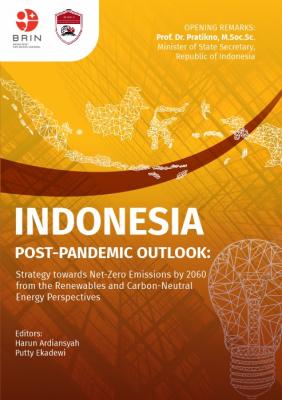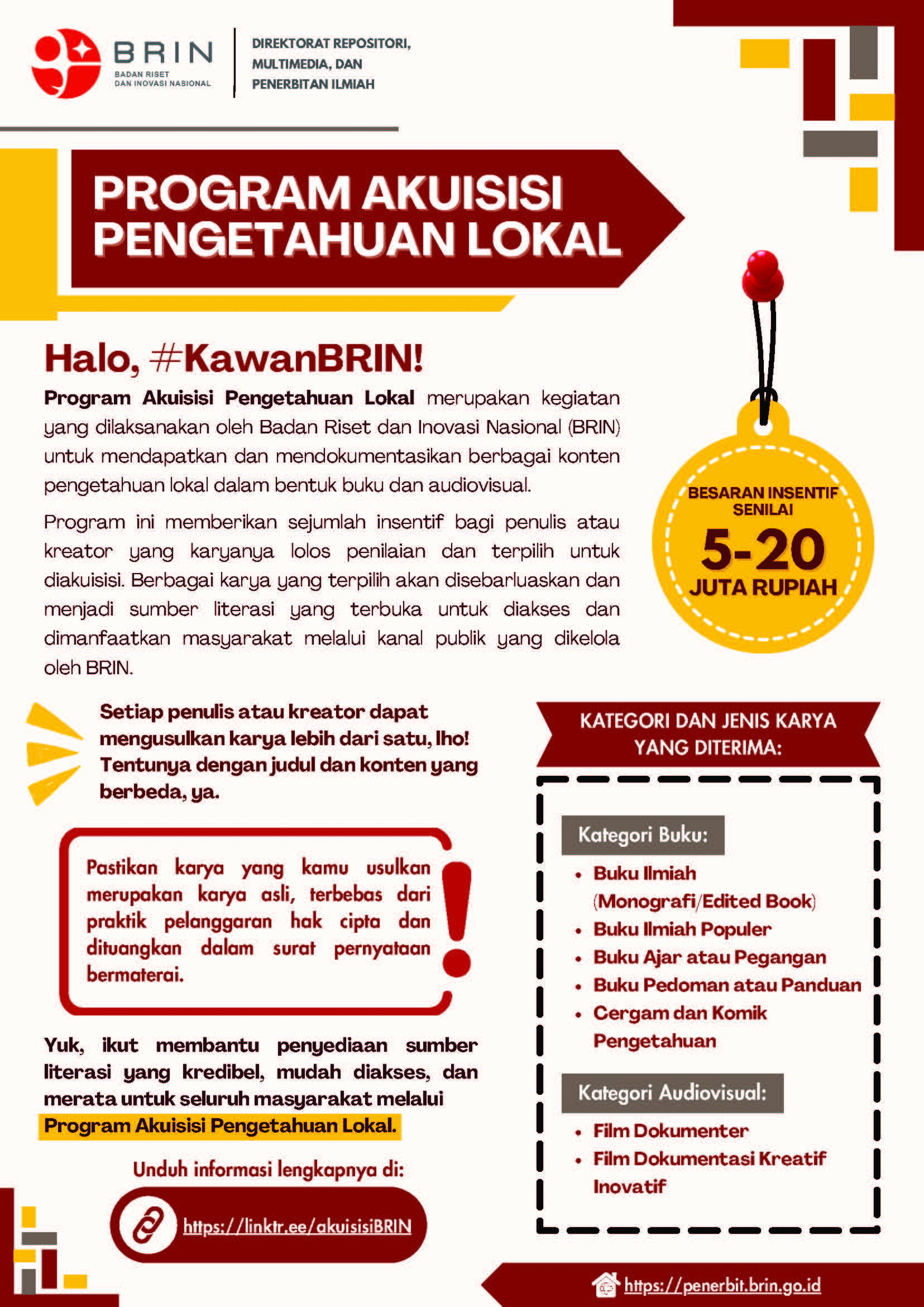Indonesia Post-Pandemic Outlook: Strategy towards Net-Zero Emissions by 2060 from the Renewables and Carbon-Neutral Energy Perspectives
Keywords:
Energy, Renewable Energy, Carbon-free, Net-zero emission, Indonesia, Socio-economicSynopsis
COVID-19 has disrupted all aspects of human life. To mitigate the impact of the pandemic, several efforts have been taken, including by Indonesian scholars abroad. This book entitled Indonesia Post-Pandemic Recovery Outlook: Strategy towards Net-Zero Emissions by 2060 from the Renewables and Carbon-Neutral Energy Perspectives explores energy sustainability and climate change issues and how it can progress further. There are also discussion on the delays caused by the COVID-19 pandemic to a few major renewable energy projects that should have been done in 2020-2021. Comprising of 14 chapters, this book is divided into three sections. The first part, Indonesia's Current Position and Strategy for Renewable Energy, explores Indonesia's current position and strategy on New and Renewable Energy. This chapter also explores Indonesia's commitment towards Net-Zero Carbon Emission 2060. Second, Carbon-Free and Renewable Energy in Indonesia, discusses the status of renewable energy use in the world, elaborate on the carbon impact of energy shift from fossil to renewable sources, and introduce a new criterion in renewable energy: carbon-neutral energy. The last part, Indonesia's New Strategy to Achieve Net-Zero Emission in 2060, explores the macroeconomic benefits of renewable and carbon-neutral energy deployment which are increasing energy security, fueling GDP development, creating job opportunities, enhancing human welfare, and achieving gender equality. We hope that this book can be a valuable reference for stakeholders, policymakers, as well as society to recover from the pandemic crisis and find better solutions to benefit future generations.
Chapters
-
Introduction
-
Indonesia’s National Strategy and Commitment towards Transition to Renewable Energy
-
Challenges Facing Indonesia’s Energy Commitment
-
Moving from New and Renewable Energy to Renewable and Carbon-Free Energy
-
Solar Energy Potentials and Opportunity of Floating Solar PV in Indonesia
-
Hydropower Technology: Potential, Challenges, and the Future
-
Wind Power in Indonesia: Potential, Challenges, and Current Technology Overview
-
Biomass Energy
-
Geothermal Energy in Indonesia
-
The Case for Nuclear Energy
-
Unlocking the Potential of Hydrogen in Indonesia
-
Socio-Economic Impacts of Renewable and Carbon-Neutral Energy Development
-
Pathways and Recommendations on Energy Transition Strategy to Achieve Net-Zero Emissions by 2060
-
Closing Summary: Deploying Indonesia’s Energy Resources for a National Carbon-Neutral Energy Ecosystem
Downloads
References
Dewan Nasional Perubahan Iklim. (2010). Indonesia’s plan to reduce GHG emission. https://unfccc.int/files/meetings/cop_15/copenhagen_accord/application/pdf/indonesiacphaccord.pdf
Dewan Perwakilan Rakyat (DPR RI). (2021). Naskah akademik rancangan undang-undang energi baru dan terbarukan.
Rancangan Undang-Undang Energi Baru dan Terbarukan. (2021) (testimony of DPR RI).
Hayden, F. G. (2002). Policymaking network of the iron-triangle subgovernment for licensing hazardous waste facilities. Journal of Economic Issues, 36(2), 477–484. https://doi.org/10.1080/00213624.2002.11506492
Indonesia. (2014). Peraturan pemerintah no. 79 tahun 2014 (pp. 1–36).
International Energy Agency (IEA). (2020). Coal 2020. https://www.iea.org/reports/coal-2020
Kementerian Energi dan Sumber Daya Mineral (KESDM). (2006). Blueprint pengelolaan energi nasional tahun 2006–2025. https://www.esdm.go.id/assets/media/content/Blueprint_PEN_tgl_10_Nop_2007.pdf
Ministry of Environment and Forestry Directorate General of Climate Change. (2021). Updated nationally determined contribution Republic of Indonesia 2021. http://ditjenppi.menlhk.go.id/reddplus/images/adminppi/adaptasi/dokumen/Updated_NDC.pdf
Ministry of Foreign Affairs. (2019). Indonesia’s non-permanent membership to the United Nations Security Council period 2019–2020. https://kemlu.go.id/portal/en/read/147/halaman_list_lainnya/indonesian-membership-on-the-un-security-council
National Energy Council of Indonesia. (2020). Indonesia energy outlook 2019. https://www.esdm.go.id/assets/media/content/content-indonesia-energy-outlook-2019-english-version.pdf
PT Perusahaan Listrik Negara, T. (2021). Rencana usaha penyediaan tenaga listrik (RUPTL) PT PLN (Persero) 2021–2030. https://web.pln.co.id/statics/uploads/2021/10/ruptl-2021-2030.pdf
Sekretriat Kabinet RI. (2021). President Jokowi: Indonesia’ s economic transformation leap starts from developing green industrial area. https://setkab.go.id/en/president-jokowi-indonesias-economic-transformation-leap-starts-from-developing-green-industrial-area/
Suoneto, N., & Paramitha, G. (2021). Indonesia’s participation at COP26. The Diplomat. https://thediplomat.com/2021/11/indonesias-participation-at-cop26/
The United Nations Framework Convention on Climate Change (UNFCCC). (2009). COP15: Copenhagen accord. Report of the Conference of the Parties on its fifteenth session, Copenhagen, 7–19 December 2009. https://unfccc.int/resource/docs/2009/cop15/eng/11a01.pdf

Downloads
Published
License

This work is licensed under a Creative Commons Attribution-NonCommercial-ShareAlike 4.0 International License.






























